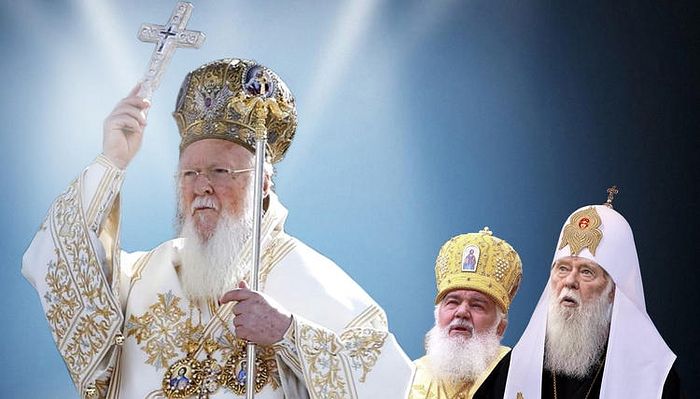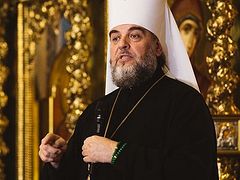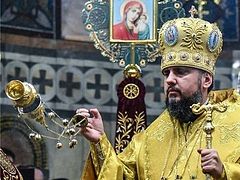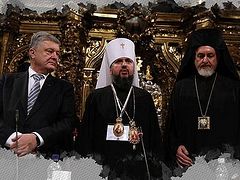Kiev, December 21, 2018
The Patriarchate of Constantinople had to take over the process of preparing for and convening last Saturday’s “unification council” because the two Ukrainian schismatic groups that united at the “council” were unable to work together and make any progress, according to Archimandrite Cyril Hovorun.
In an interview with the Ukrainian site Left Bank, Archim. Cyril, a theologian, scholar, professor at the University of Loyola-Maryomount in Los Angeles, and cleric of the canonical Church known for his involvement in the Ukrainian autocephaly movement, explains that the statutes for the new church and the convening of the gathering were taken over by Constantinople as a last-ditch effort to save the autocephaly process.
An English translation of the interview is available at the site Panorthodox Synod. Some quotes have been lightly edited by OrthoChristian.
“The original scenario … presupposed that the Council should be convened on the initiative of Ukrainian churches. And this was supposed to be the constituent council. But since the Ukrainian churches failed to convene it on their own initiative, the Constantinople Patriarchate took this mission on its own and sent a letter to each potential delegate with a personal invitation to take part in the council,” Fr. Cyril explains.
His insight helps explain how the “council” was able to finish its work, as leading up to it convocation on December 15, representatives from the “Ukrainian Autocephalous Orthodox Church” (UAOC) told the media several times that the preparatory committee had never met and thus had made no progress. Makary Maletich, the head of the UAOC, largely attributed the impasse to Philaret Denisenko, the head of the “Kiev Patriarchate” (KP) who insisted that everything be done according to the KP model.
On this point, Fr. Cyril comments: “The most influential part of the establishment, of the Kiev Patriarchate, wanted to preserve the status quo in the new church. That is, it was in fact to remain the Kiev Patriarchate, simply with a different name that would receive approval from Constantinople.”
Philaret himself commented just days before the “council” that if his group didn’t like its conditions, they simply wouldn’t participate in the votes. Just a week before the “council,” the UAOC and KP were still arguing, and literally fighting, over clergy and parish affiliations, and one UAOC representative expressed his worry that the “council” would simply dissolve into such a fight.
Thus, Constantinople was forced to take over the process, and its invitations stipulated that each bishop should bring one representative from among his clergy and one from among his laity to participate in the work of the council and cast votes. However, the Synod of the KP declared one week before the “council” that only bishops should participate, thus, Archim. Cyril explains, “Constantinople took over the council and prevented the monopolization of this process by the Kiev Patriarchate and made the council inclusive... I want to emphasize: For Constantinople it was very important that the maximum number of participants from all Ukrainian churches took part in this council.”
The Ukrainian state attempted to fulfill this desire of Constantinople by forcing several bishops to go to Kiev and give Simeon Shostasky, the former Metropolitan of Vinnitsa and Bar, the right to vote on their behalves. They refused, however, to attend the “council,” and in the end, the Constantinople hierarchs who were overseeing the “council” would not accept these written votes.
Fr. Cyril also offers several reasons why more bishops of the canonical Church did not attend the “council,” including that the hierarchs of the KP simply were not interested in having broad representation from the UOC—likely because then the vote for primate would have been out of its hands.
Fr. Cyril explained that the churches failed to organize the “council” because they still live in a paradigm of Byzantine symphony where the state is the main partner and even initiator of events for the Orthodox Church. Ukrainian President Petro Poroshenko was welcomed at Saturday’s gathering with the ringing of the St. Sophia Cathedral bells, whereas no bishop was received so ceremoniously, and it was Poroshenko who introduced the new primate, “Metropolitan” Epiphany to the people gathered outside the cathedral.
The KP and UAOC also failed to cooperate and write the statutes for the new church, and thus, as OrthoChristian previously reported, Constantinople wrote the statutes on their behalves.
“The original scenario assumed that the Ukrainian side would prepare its own charter,” Fr. Cyril explained. “This was not done. From the electoral point of view, so to speak, the tomos is much more important than the charter. And that is why the charter was not discussed.”
“I would like to note how I personally heard from the Exarchs that the interest of Constantinople was to give the Ukrainians the maximum opportunity to show themselves and to agree with each other. Since the Ukrainians, I can say frankly, could not agree with each other on most issues, Constantinople took the initiative into its own hands, including such a crucial issue as the charter for the new church,” Fr. Cyril further explained.
He also said that all these failures of the Ukrainian schismatics to work together and guide their own process led to the new church being downgraded from a patriarchate to a metropolitanate: “I want to emphasize once again that, as in the previous cases, the culprit is disorganization, the inability to consolidate and act without an external partner on the part of Ukrainian bishops.”
Follow us on Facebook!




